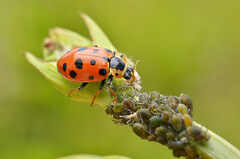
Some bugs are detrimental to your lawn and garden, but others have a lot of good to offer. Learning to differentiate between the insects you want to eliminate and those you want to encourage is part of an effective organic approach to pest control. So, what benefits can the right bugs bring to your landscape?
There are several beneficial parasitic and predatory insects that are natural enemies to harmful insects that you don’t want around. Some of them even offer the added benefit of breaking down organic matter for plants to use as nutrients.
Parasites: Parasitoids enter or attach to host insects at the egg stage and live inside that insect while feeding on it until it dies. Wasps and flies make up the majority of this group, and both are highly attracted to flowering plants.
- Wasps: Parasitic wasps are tiny wasps that lay eggs inside soft-bodied insects or attack the eggs, helping control populations of pests like grubs and caterpillars. Note that these wasps don’t present any danger to humans.
- Tachinid Flies: Resembling houseflies, these parasites offer a great defense against caterpillars, armyworms, Japanese beetles and even snails. These flies attack pests a few ways. They may lay eggs on leaves where they know the host will eat them, or they attach their eggs directly to the host. Some even have the ability to inject their eggs straight into the host’s body to kill them from the inside out. They’re big fans of plants that produce pollen and nectar if you’re looking to invite more to your yard to help combat harmful pests.
Predators: This valuable group of insects feeds on other insects throughout their life cycle. Some of the ones common to the Atlanta area are:
- Lady Bugs: Also called lady beetles or ladybirds, these pretty bugs are ones you want to encourage to stick around. They feed on many soft-bodied insects that can harm your plants, including aphids that suck the life out of your trees and shrubs. They are drawn to flower nectar and pollen, so plant away to attract more.
- Lacewings: Adult lacewings are brown or pale green and look similar to dragonflies. But it’s their larvae that offer the real benefits. Lacewing larvae are ravenous predators of many common pests, including aphids, caterpillars, insect eggs, mites and whiteflies. The adults mainly feed on plant nectar, so including the right plants in your landscape will help attract them.
- Spiders: Though not an insect, spiders are also great predators to have around. While they can be pretty intimidating, most spiders you see in your garden will not migrate inside, and they are quite helpful in preventing pest outbreaks. Some spiders use their webbing to capture prey, while others actively hunt for pests. Once captured, they finish the job with their jaws and piercing fangs.
- Wheel Bugs: You’ll have to weigh the benefit against the risk of their painful bite when deciding whether to keep these assassin bugs around. If bothered, wheel bugs may bite humans, initiating pain worse than a bee sting. But when left undisturbed, they have great benefits. They are a greyish brown and resemble the infamous stinkbug. They’re held in high regard among organic gardeners for their ability to eliminate larger pests, including caterpillars, bees and Japanese beetles. Wheel bugs lunge forward with their long front legs to capture their prey. Then they pierce their needle-like beak into the prey, injecting saliva that paralyzes their captive and dissolves its innards. The wheel bug proceeds to suck out the body fluids.
- Big-Eyed Bugs: Scientifically referred to as Geocoris, these guys can offer a lot of help when it comes to controlling pests in turf and and on your ornamental trees and shrubs. Their broad heads have noticeably large eyes compared to their small, black or brown, oval body. They like to feed on an array of insects, including aphids, mites and leafhoppers.. Want more in your garden? Attract them with clovers and bits of potatoes.
Follow Mother Nature’s lead for pest control. Attract the good bugs as a natural form of control, and use insecticides selectively. Welcome those insects that help support your plant life and organic landscape.

